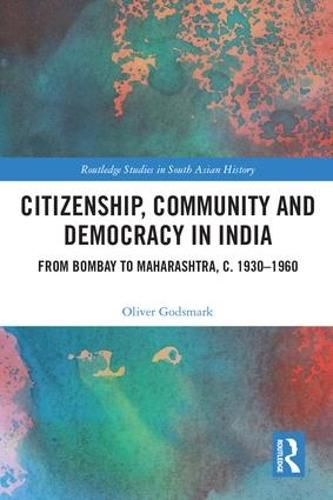Readings Newsletter
Become a Readings Member to make your shopping experience even easier.
Sign in or sign up for free!
You’re not far away from qualifying for FREE standard shipping within Australia
You’ve qualified for FREE standard shipping within Australia
The cart is loading…






On 1 May 1960, Bombay Province was bifurcated into the two new provinces of Gujarat and Maharashtra, amidst scenes of great public fanfare and acclaim. This decision marked the culmination of a lengthy campaign for the creation of Samyukta (‘united’) Maharashtra in western India, which had first been raised by some Marathi speakers during the interwar years, and then persistently demanded by Marathi-speaking politicians ever since the mid-1940s. In the context of an impending independence, some of its proponents had envisaged Maharashtra as an autonomous domain encompassing a community of Marathi speakers, which would be constructed around exclusivist notions of belonging and majoritarian democratic frames. As a result, linguistic reorganisation was also quickly considered to be a threat, posing questions for others about the extent to which they belonged to this imagined space.
This book delivers ground-breaking perspectives upon nascent conceptions and workings of citizenship and democracy during the colonial/postcolonial transition. It examines how processes of democratisation and provincialisation during the interwar years contributed to demands and concerns and offers a broadened and imaginative outlook on India’s partition.
Drawing upon a novel body of archival research, the book ultimately suggests Pakistan might also be considered as just one paradigmatic example of a range of coterminous calls for regional autonomy and statehood, informed by a majoritarian democratic logic that had an extensive contemporary circulation. It will be of interest to academics in the fields of South Asian history in general and the Partition in particular as well as to those interested in British colonialism and postcolonial studies.
$9.00 standard shipping within Australia
FREE standard shipping within Australia for orders over $100.00
Express & International shipping calculated at checkout
On 1 May 1960, Bombay Province was bifurcated into the two new provinces of Gujarat and Maharashtra, amidst scenes of great public fanfare and acclaim. This decision marked the culmination of a lengthy campaign for the creation of Samyukta (‘united’) Maharashtra in western India, which had first been raised by some Marathi speakers during the interwar years, and then persistently demanded by Marathi-speaking politicians ever since the mid-1940s. In the context of an impending independence, some of its proponents had envisaged Maharashtra as an autonomous domain encompassing a community of Marathi speakers, which would be constructed around exclusivist notions of belonging and majoritarian democratic frames. As a result, linguistic reorganisation was also quickly considered to be a threat, posing questions for others about the extent to which they belonged to this imagined space.
This book delivers ground-breaking perspectives upon nascent conceptions and workings of citizenship and democracy during the colonial/postcolonial transition. It examines how processes of democratisation and provincialisation during the interwar years contributed to demands and concerns and offers a broadened and imaginative outlook on India’s partition.
Drawing upon a novel body of archival research, the book ultimately suggests Pakistan might also be considered as just one paradigmatic example of a range of coterminous calls for regional autonomy and statehood, informed by a majoritarian democratic logic that had an extensive contemporary circulation. It will be of interest to academics in the fields of South Asian history in general and the Partition in particular as well as to those interested in British colonialism and postcolonial studies.